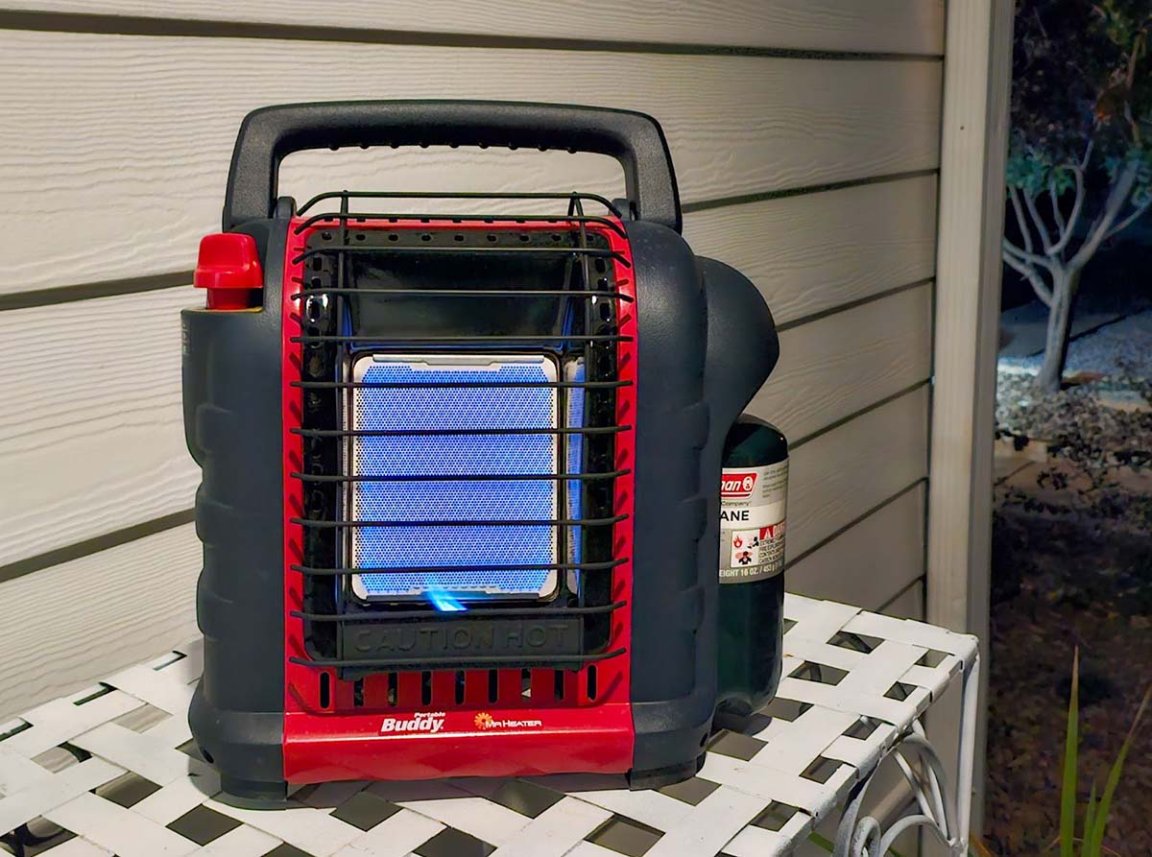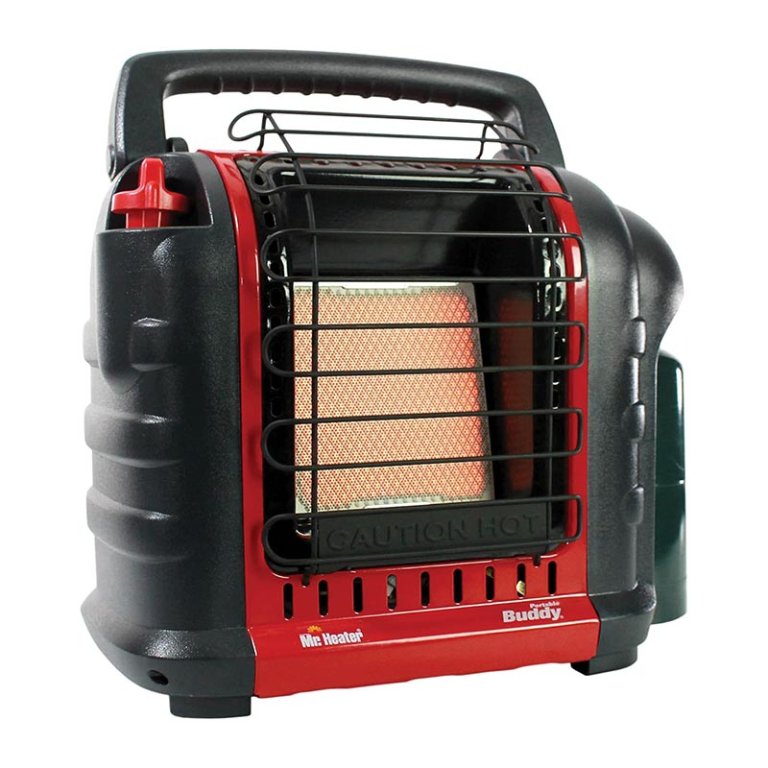We may earn revenue from the products available on this page and participate in affiliate programs. Learn More ›
While being plunged into darkness during a blackout is never ideal, indoor heaters are designed to solve one of the greatest problems a power outage can cause: how to keep yourself and your family warm. Even gas furnaces rely on electricity to ignite, so it’s crucial to have other ways to heat your home in an emergency.
There are two main types of non-electric heaters: kerosene and propane. Kerosene burns hotter, but propane burns cleaner, making propane the better option from an environmental perspective. Additionally, kerosene comes in plastic bottles or cans, whereas propane comes in tanks that some find more convenient, particularly because propane can fuel both heaters and barbecue grills.
Since there are quite a few emergency heaters from which to choose on the market today, we created this guide to offer some assistance. As you read, bear in mind that most of the best indoor heaters for power outages are very portable, so they are also ideal for use on the deck or patio on chilly evenings. Some of these heaters are suitable for camping as well.
How We Chose the Best Indoor Heaters for Power Outages
We considered several different types of heaters, including models that can heat food and also options that require connection to a natural gas line. For our final curated list, we focused on stand-alone room heaters, although some are also for outdoor use.
A power outage heater needs clear controls so it is easy to use in a blackout. The size of the room it is capable of heating is also important. As our experts noted, safety is vital for heaters for power outage use, so we sought the advice of heating experts. Colin Matei, President of Clean Air Heating & Cooling, agreed with our thoughts and suggested “choosing a model with an oxygen depletion sensor and sized properly for your space.” HVAC professional Brian Arthur, owner of Arthur’s Air, focused on solutions to potential hazards, noting “Safety features like automatic shut-off and tilt sensors are essential to prevent accidents.” Based on these recommendations, we looked for models with an oxygen depletion sensor (ODS) that turns the device off if carbon monoxide levels start to rise and a tilt sensor that does the same if the device is knocked over.
Best Overall
Mr. Heater MH9BX Indoor-Safe Portable Propane Heater
See ItWhat We Like
- Lightweight and easy to carry
- Multiple safety features
- Runs from 3 to 6 hours
What We Don’t Like
- Occasional faults with ignition
- Creates a popping sound as propane runs out
Product Specs
- Heat output: 4,000 to 9,000 BTU
- Coverage: 225 square feet
- Fuel: 1-pound propane cylinder
Shoppers looking for alternative heating sources that are light, easy to move, affordable, and safe will certainly want to check out the Mr. Heater MH9BX Portable Propane Heater. At just 10.6 pounds and a built-in handle, this model is convenient to carry around. With dimensions of 13.25 inches tall by 13.25 inches wide by 8 inches deep, it’s also compact enough to not take up a lot of space in storage when preparing for a power outage.
The heat output is 4,000 to 9,000 BTU, and—using a 1-pound propane cylinder—this heater provides 3 to 6 hours of warmth to an area of 225 square feet. For comparison, a 14-foot by 16-foot room is 224 square feet. A connector for a 20-pound tank is an option for this model if a longer duration of heat is needed. The Mr. Heater is indoor-safe with an oxygen depletion sensor and a tilt sensor.
Hands-on tester Glenda Taylor summed up the benefits of the Mr. Heater indoor heater in her full review: “For anyone seeking a portable, efficient, and versatile heating solution for a diverse range of indoor and outdoor scenarios, the Mr. Heater can be a valuable addition.”
Get the Mr. Heater indoor heater for power outages at Amazon or The Home Depot.
More of Our Favorite Indoor Heaters for Power Outages
The Mr. Heater is a versatile and economical solution, but it may not suit every user’s needs. We’ve also noted below a few carefully selected alternatives that meet our above-mentioned criteria and provide solutions to various heating needs in the event of a power outage. All of these options except for the cabinet heater are easy to carry and are also suitable for outdoor use.
- Vesta Self-Powered Indoor/Outdoor Heater & Stove, available at Amazon.
- Sengoku CV 23K KeroHeat Indoor Outdoor Convection Space Heater, available at Amazon, The Home Depot, or Target.
- Dyna-Glo RA18LPDG Cabinet Heater, available at Amazon, Lowe’s, or The Home Depot.
- Kero World KW-24G Indoor Kerosene Heater, available at Amazon.
FAQs
During our research for this guide about indoor heaters for power outages, we found a few questions that cropped up regularly, so we have provided answers below.
Although there are numerous non-electric heaters, we couldn’t find a solar-powered model. However, you could use a portable solar power station and plug an electric heater into it.
At the time of this writing, kerosene is cheaper than propane, but even the best kerosene heater typically uses more fuel than propane equivalents. Propane also produces fewer emissions. To determine the correct answer to this question, each heater needs to be judged against comparable rivals.
No. Most indoor heaters that don’t require electricity produce a naked flame that presents a fire risk. Propane and kerosene also produce carbon monoxide, which is toxic, and while the safety sensor should turn off the heater before the levels become dangerous, it’s not a good idea to leave them unattended.
As mentioned above, propane heaters emit carbon monoxide (CO) that is toxic. For safety reasons, a propane heater should have a sensor that automatically turns the heater off if CO levels are too high.
Comparison tests have shown that although a propane wall heater is typically more expensive than an electric equivalent, the cost difference is only around 10 percent—and you can run a propane heater without electricity during a power outage.


